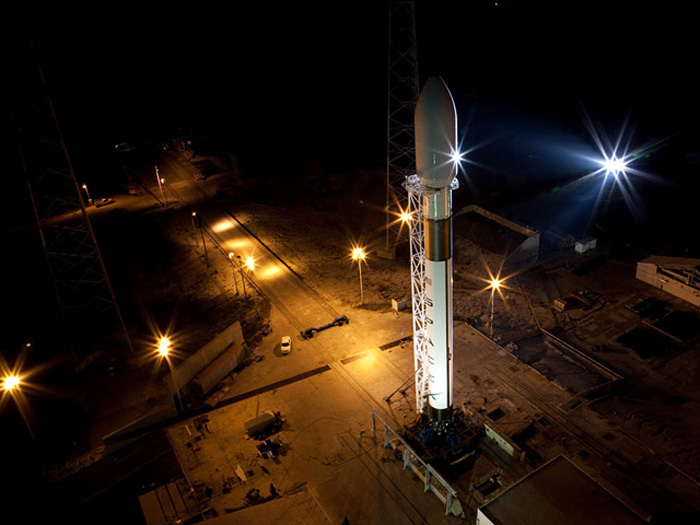
http://www.space.com/missionlaunches/011907_spacex_falc1_delay.htmlSpace Exploration Technologies (SpaceX) announced Friday that it will not attempt the second launch of its Falcon 1 rocket before mid-February.
The announcement came the same day the El Segundo, Calif.-based company was preparing to conduct a static fire test of the rocket in preparation for a planned Jan. 22 launch from the Kwajalein Atoll in the Pacific Ocean .
SpaceX CEO Elon Musk, in an update posted on the company’s website, said the decision to postpone was due to concerns about the thrust vector control pitch actuator on the Falcon 1′s second stage. The anomaly was discovered during a final checkout of the Falcon 1 in preparation for the static fire, a thorough on-the-pad shakeout of the rocket that culminates with a short four-second main engine burn.
Since the suspect component does not come into play during the static fire, SpaceX intends to go ahead and conduct the test between Jan. 20 and Jan. 23. After that, Musk said, the rocket will be taken back to its hangar to permit a thorough investigation of the thrust vector control issue.
SpaceX, which had reserved a two-day window for the launch attempt, loses use of the range for a while starting Jan. 24 when the U.S. military is expected to begin preparation for an upcoming Minuteman missile test.
Musk said the company is now planning for a mid-February launch attempt, but emphasized that it is far from certain that the Falcon will actually lift off then.
“As I’ve mentioned previously, don’t hold your breath for this launch,” Musk said. “Given the large number of robustness improvements and the fact that our vehicle/pad health verification system has increased from about 30 checks to almost 1000, shifts in the launch date are to be expected. Overall, the SpaceX team is quite happy with the smooth progress so far.”
Gwynne Shotwell, SpaceX’s vice president of business development, told SPACE.com that the Falcon 1 launch’s mid-February flight window opens on Feb. 18. The booster will carry two experimental payloads – including a low-cost satellite communications tranceiver and an autonomous flight safety system – will launch aboard the Falcon 1′s next flight, Shotwell added.
The upcoming launch is a demonstration flight paid for by the U.S. Defense Advanced Research Projects Agency (DARPA), which also paid for the Falcon 1′s unsuccessful debut last March .
SPACE.com Staff Writer Tariq Malik contributed to this report.

 Board
Board
 NewTech
NewTech

